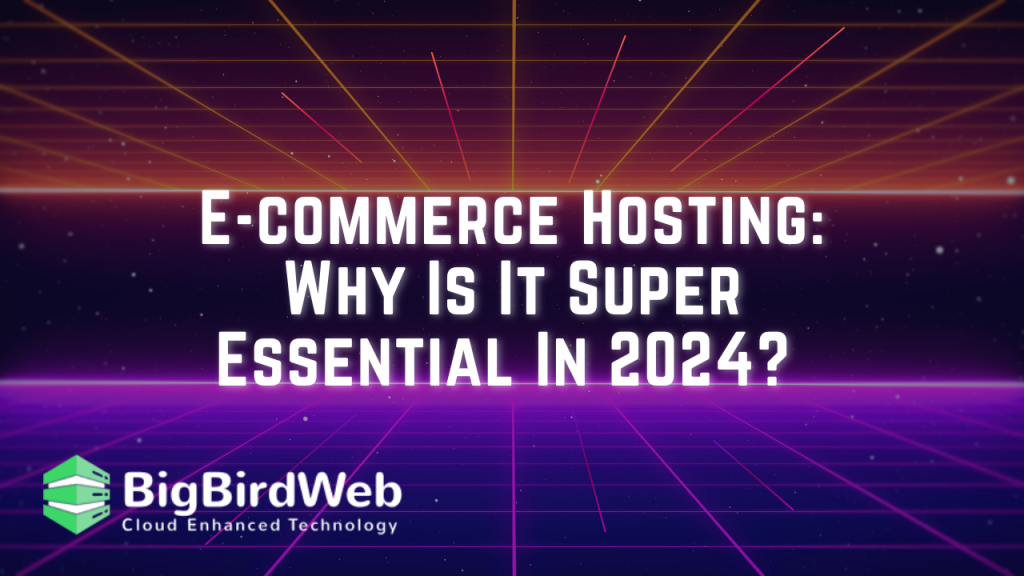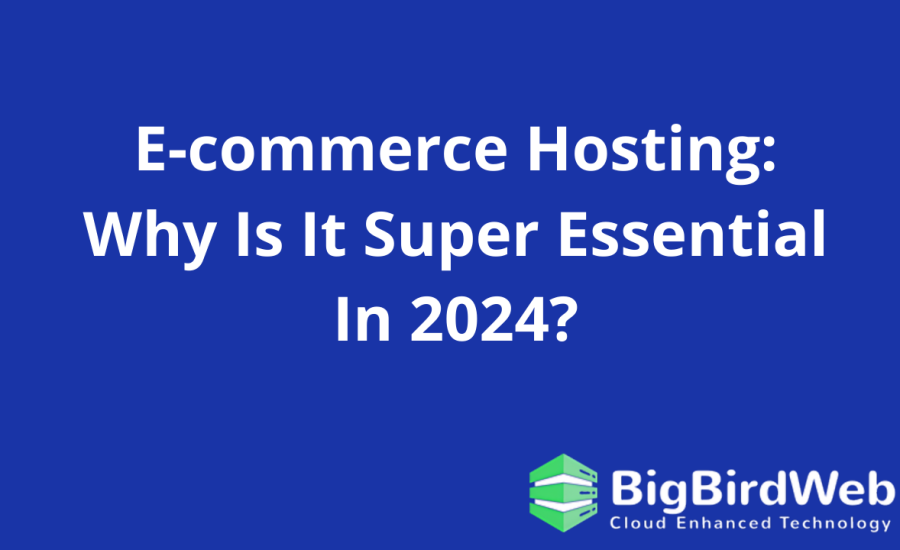E-commerce hosting is a specialized service designed to support the unique requirements of online stores. It provides the infrastructure and tools needed to run an e-commerce website smoothly, ensuring it can handle high traffic volumes, secure transactions, and offer a seamless shopping experience. In this blog, we’ll delve into what e-commerce hosting is, explore its various categories, and provide illustrations to help you understand how to choose the best option for your online business.

Table of Contents
Understanding E-commerce Hosting

What is E-commerce Hosting?
E-commerce hosting refers to web hosting services tailored specifically for online stores. Unlike general web hosting, e-commerce hosting includes features and tools that cater to the needs of online businesses. These features often include enhanced security measures, payment processing capabilities, and scalability to handle varying traffic loads.
Why is E-commerce Hosting Important?
- Security: Hosting provides advanced security features to protect sensitive customer information and ensure secure transactions.
- Performance: It ensures your website can handle high traffic volumes, providing fast load times and a seamless user experience.
- Reliability: With robust infrastructure, hosting minimizes downtime, ensuring your store is always accessible to customers.
- Support: Dedicated support for e-commerce platforms helps resolve issues quickly, ensuring your business runs smoothly.
Categories of E-commerce Hosting
1. Shared E-commerce Hosting
Shared e-commerce hosting is the most cost-effective option where multiple websites share the same server resources. It’s suitable for small businesses or startups with limited budgets.
Pros:
- Cost-Effective: Shared hosting is the most affordable option, making it accessible for small businesses.
- Ease of Use: Often comes with user-friendly control panels and simple setup processes.
Cons:
- Limited Resources: Sharing server resources can lead to slower performance, especially during peak traffic.
- Less Control: Limited customization options compared to other hosting types.
Illustration:
Imagine a small local boutique starting its online store. Shared e-commerce hosting provides an affordable entry point, allowing the boutique to establish its online presence without significant investment.
2. VPS E-commerce Hosting
Virtual Private Server (VPS) hosting provides a dedicated portion of a server’s resources. It offers a balance between cost and performance, suitable for growing businesses.
Pros:
- Dedicated Resources: More CPU, RAM, and storage than shared hosting, ensuring better performance.
- Scalability: Easier to scale resources as your business grows.
Cons:
- Higher Cost: More expensive than shared hosting but still affordable compared to dedicated hosting. You can also opt for free web hosting.
- Technical Knowledge Required: Requires some level of technical expertise for server management.
Illustration:
A mid-sized online retailer experiencing growth in traffic and sales can benefit from VPS hosting. The dedicated resources ensure faster load times and better user experience during high-traffic periods.
3. Dedicated E-commerce Hosting
Dedicated hosting provides an entire server for your e-commerce website. It’s ideal for large businesses with high traffic volumes and extensive resource needs.
Pros:
- Maximum Performance: Full control over server resources ensures optimal performance.
- Customization: Complete freedom to configure the server to meet specific needs.
Cons:
- High Cost: The most expensive hosting option, suitable for businesses with significant budgets.
- Technical Expertise: Requires advanced technical skills to manage and maintain the server.
Illustration:
A large e-commerce platform, like an online marketplace with thousands of products and high daily traffic, would benefit from dedicated commerce hosting. The dedicated server ensures consistent performance and the ability to handle complex transactions.
4. Cloud E-commerce Hosting
Cloud hosting uses a network of virtual servers to host websites. It offers high scalability and reliability, making it suitable for businesses with fluctuating traffic patterns.
Pros:
- Scalability: Easily scale resources up or down based on demand.
- Reliability: Redundant network of servers ensures high uptime and reliability.
Cons:
- Variable Costs: Pay-as-you-go pricing can be unpredictable and potentially expensive.
- Complexity: Can be more complex to set up and manage than other hosting types.
Illustration:
An online store running seasonal promotions or flash sales can benefit from cloud e-commerce hosting. The ability to scale resources dynamically ensures the website remains operational during traffic spikes.
5. Managed E-commerce Hosting
Managed hosting provides a hands-off approach where the hosting provider takes care of server management, maintenance, and security.
Pros:
- Ease of Management: Hosting provider handles technical aspects, allowing you to focus on business operations.
- Enhanced Security: Regular updates and security measures are managed by the provider.
Cons:
- Higher Cost: More expensive due to the added management services.
- Less Control: Limited control over server configurations compared to unmanaged hosting.
Illustration:
A busy entrepreneur running an online store with limited technical knowledge would benefit from managed e-commerce hosting. The hosting provider handles all technical details, ensuring the website runs smoothly.
FAQs

1. What is the difference between shared and VPS commerce hosting?
Shared e-commerce hosting involves sharing server resources with other websites, leading to potential performance issues during high traffic. VPS e-commerce hosting provides dedicated resources, ensuring better performance and scalability.
2. Is cloud hosting suitable for all e-commerce websites?
Cloud e-commerce hosting is suitable for websites with fluctuating traffic patterns. It’s ideal for businesses experiencing seasonal spikes or running frequent promotions. However, it may not be the most cost-effective solution for websites with consistent, low traffic.
3. What are the key features to look for in an e-commerce hosting provider?
Key features include robust security measures, reliable uptime, scalability options, e-commerce-specific tools (like shopping cart software), and responsive customer support.
4. How important is managed hosting for commerce websites?
Managed e-commerce hosting is crucial for businesses without technical expertise or those who prefer to focus on core operations. It ensures that server management, security, and maintenance are handled by professionals, reducing the risk of technical issues affecting the website.
Bonus Content: Tips for Optimizing Hosting Performance
1. Implement a Content Delivery Network (CDN)
A CDN distributes your website content across multiple servers globally, reducing load times and improving performance for users worldwide. This is especially beneficial for e-commerce websites with international customers.
2. Optimize Images and Media
Large images and media files can slow down your website. Use image optimization tools to compress files without sacrificing quality, enhancing load times and user experience.
3. Enable Caching
Caching stores a version of your website in the user’s browser, reducing the need to reload the entire page on subsequent visits. This can significantly speed up load times.
4. Regularly Update Software
Ensure your e-commerce platform, plugins, and server software are regularly updated to the latest versions. This improves security, performance, and compatibility with new technologies.
5. Monitor Website Performance
Use performance monitoring tools to track your website’s speed, uptime, and user behavior. Regularly review these metrics to identify and address potential issues before they affect your customers.
In conclusion, commerce hosting is a specialized service designed to meet the unique needs of online stores. By understanding the different categories—shared, VPS, dedicated, cloud, and managed hosting—you can choose the best option for your business. Each category has its own pros and cons, making it essential to evaluate your specific needs and budget. With the right hosting solution, you can ensure your e-commerce website runs smoothly, providing a secure and enjoyable shopping experience for your customers.
